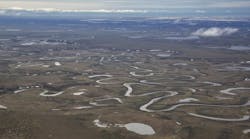Covering the worldwide petroleum industry has taken Oil & Gas Journal editors, well, worldwide: from eastern Oklahoma to southern Russia to western Colombia to the northern North Sea; to Doha, Lagos, even Vernal, Utah. That list is indicative, not exhaustive.
It would be no exaggeration to say that wherever oil and gas companies have gone to search for, find, produce, and move hydrocarbons, a Journal editor has—at some time—followed. The occasion may not have coincided with initial discovery, but it's safe to say one of us eventually got there, wherever it is or was, to observe and report on operations.
This travel has enriched the lives and careers of many. Exposure to cultures, languages, and perspectives inevitably and ideally does that.
But such travel has also brought its fair share of memorable, sometimes scary incidents.
Cases in point
Conducting an interview during construction of the first Argentina-to-Chile gas pipeline, I was sitting in a modern office in a modern building in the modernizing city of Santiago when the room began to shake.
I seemed to be the only one noticing. It was difficult to write. And the surface of my coffee in its cup looked more like a miniature version of the surf at Waikiki.
"An earthquake" came the laconic explanation from a host; "They're quite normal here." Normal to folks there, perhaps; but not to someone used only to the seasonal monsoons of Houston. That quiver in the pit of the stomach takes a while to dissipate.
Some memorable experiences have not taken place on land at all.
A few years ago, Sr. Editor-Technology Bob Lawson was along on a press tour of the US Strategic Petroleum Reserves across southern Louisiana and Texas. The group boarded a helicopter in a New Orleans parking lot and headed over the Mississippi River towards vast marshes that teem with all sorts of wildlife, especially birds.
A series of sudden and loud vibrations from over the cabin abruptly shook the helicopter. The pilot exclaimed loudly (and profanely) and quickly turned the chopper back to the nearest suitable, emergency-landing area—a New Orleans city park.
When inspection of the storage compartment revealed nothing out of the ordinary, the trip resumed. Only later was it discovered, says Bob, that the hatch covering the engine's air intake—and protecting it from large birds, among other objects—had torn loose and been thumped around by the chopper's blades before being batted out into the marshes.
Had the helicopter encountered any of the flocks of birds that crowd the skies of South Louisiana's marshes, it could have rapidly followed the hatch.
But not all close calls for Journal editors have been based in nature. Some editors have feared for their lives—or at least their skins—in the very halls of the companies they've covered.
Chief Editor-Exploration and Economics Alan Petzet reports such an encounter during an annual meeting of Gulf Oil Corp. in Pittsburgh. (You remember Gulf Oil, don't you?)
T. Boone Pickens was at the height of his "shareholder rights" campaign, says Alan, and faced a hostile group of Gulf Oil shareholders intent on heckling him during his presentation.
Roaming the aisles of the meeting, snapping photos of Pickens and Gulf executives, Alan found himself dodging verbal abuse and insults from those hostile shareholders, because Alan—at 6 ft 7 in. and 230 lb—was screening them from the object of their wrath, Pickens.
"They were yelling 'Sit down!' at Pickens and 'Get out of the way!' at me," says Alan, who survived the incident—something that cannot be said for Gulf Oil.
Compensation
These incidents happened on the job. There's an entire category for experiences during the off-hours of business trips.
Executive Editor Bob Williams has covered Alaska for years and hiked much of it off-duty. He recounts falling off a glacier, being chased by a moose, and nearly stumbling into Cook Inlet amid beluga whales having dinner.
Journal editors don't get hazardous-duty pay; no journalist does. The experiences, especially those that bring us face to face with our own vulnerability, if not mortality, come with the job. And we wouldn't have it any other way.
The petroleum industry is global; serving Journal readers requires its editors get out of their comfortable offices and follow it. And we do, every chance we get.

